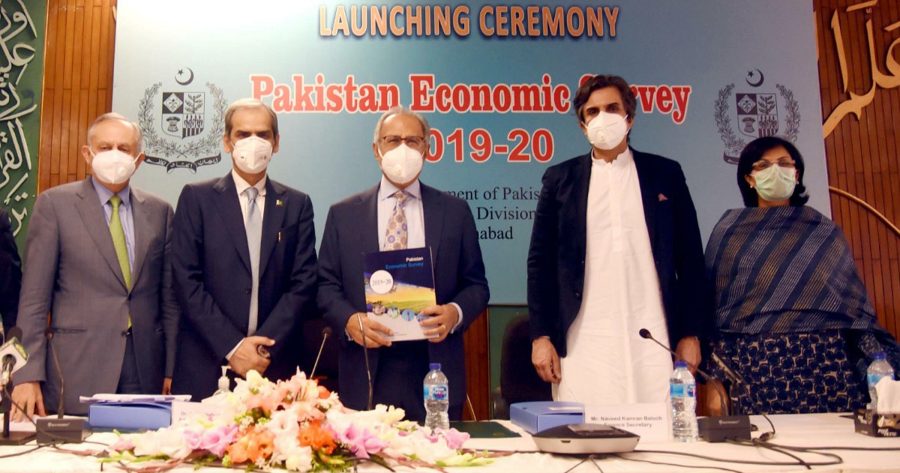Economic Survey 2019-2020 released
Agri sector growth remains at 2.6pc; Current account deficit shrinks a whopping 73pc to under $3b; GDP target for 2020-21 set at 2.30pc
Staff Reporter
Islamabad
Advisor to Prime Minister of Finance and Revenue, Dr. Abdul Hafeez Shaikh Thursday formally launched the pre-budget document, ‘Pakistan Economic Survey 2019-20’.
The pre-budget document shared the key economic indicators and the performance of different sectors of the economy during the fiscal year 2019-20.
The Survey highlighted the main features of the policies undertaken by the present government, that focused on bringing the macro-economic stability and putting the economy on growth trajectory.
The survey covered pre and post-COVID-19 economic situation of the country besides giving detailed picture of growth and investment, agriculture, manufacturing, mining, fiscal development, money and credit, capital markets, inflation, debt and liabilities.
It also highlighted the performance of agriculture, education, health and nutrition, besides showing the overall population, labour force and employment, poverty, transport and communication and per capita income.
The Adviser to the Prime Minister on Finance Hafeez Sheikh said on Thursday said, the provisional GDP growth rate for fiscal year 2020 is estimated at negative 0.38 per cent on the basis of 2.67, -2.64 and -0.59pc growth in agricultural, industrial and services sectors respectively.
The PM’s Adviser Sheikh said that the government had inherited an economy deep in debt, with depleting foreign reserves, adding that when the PTI government took power, it was looking at a potential default.
The growth seen in the past government’s tenure, Sheikh said, was being achieved by taking loans from abroad and then spending it in the country.
Sector-wise growth
He further revealed that growth in the agriculture sector came in at 2.6pc, but other sectors reported negative growth, industry recorded -2.64pc while services sector recorded -3.4pc growth. Transport and communication growth also came in at -7.1pc for Jul-April 2020, he said.
Sheikh said manufacturing contracted by 22.9pc year-on-year in March 2020 but added that “fiscal deficit was still manageable from July-March 2020 at 4pc of the GDP while last year it was 5.1pc of the GDP” in the same period.
Inflation
Consumer Price Index (CPI) inflation for the period July-April 2020 came in at 11.22pc against 6.51pc during the same period last year.
“Perishable food items are the main contributory factor in jacking up the food inflation,” according to the survey with inflation of 34.7pc recorded in this category.
FBR tax revenue
Overall tax collection by the Federal Board of Revenue (FBR) grew by 10.8pc to Rs 3,300.6 billion during July-April 2020 against Rs 2,980 billion in the comparable period last year, according to the PES document.
“The rise in tax collection is attributed to various policy initiatives implemented at the start of FY2020 such as charging sales tax on more items at the retail price under 3rd Schedule, reinstatement of taxes on telecom services and an upward revision of tax rates on various salary slabs,” the survey revealed.
But despite this increase, tax collection fell significantly below the government’s revised target of Rs3,908 billion. The target was revised from an initial Rs4,807 billion “keeping in view the economic slowdown consequent to the pandemic,” the survey said.
The survey further revealed that the pandemic had a “significant impact on revenue collection efforts of FBR”.
“During the first eight months of FY2020, FBR recorded total revenue collection of Rs 2,738 billion with a growth rate of 17.5 percent over last fiscal year. FBR was able to achieve 91.4 percent of its (first revised) target for the period,” the survey noted.
However, after the outbreak of Covid-19 pandemic, an average negative growth rate of 13.4 percent was recorded during March 2020 and April 2020 compared to last year as well as in comparison to projected collection, according to the survey.
In response to a question, Sheikh said the tax target fixed for the new fiscal year was “aspirational” but the government will not “aggressively” try to achieve it due to the current economic crisis caused by the pandemic.
Current account deficit
During July-March FY2020, current account deficit reduced by 73.1 percent to $2.8 billion (1.1 percent of GDP) against $10.3 billion last year (3.7 percent of GDP), the survey revealed. Exports in the said period increased 1.1pc to $18.3 billion, while imports reduced by a significant 16.2pc to $32.9 billion compared to $39.3 billion from a year ago.
This led to a shrinking of the trade deficit, which saw a reduction of 31pc percent to $14.7 billion in the July-March 2020 period compared to $21.3 billion last year in the same period. As a percentage of GDP, Pakistan’s trade deficit now stands at 6.6pc, considerably down from 8.5pc a year ago.










